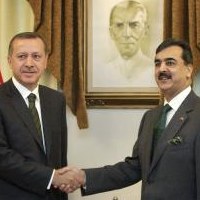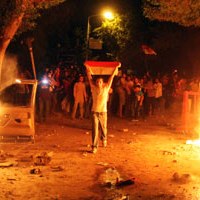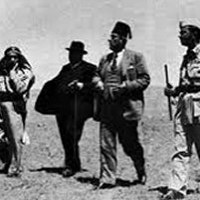![]()
Sun, Feb 27, 2011 | The Rubin Report | By Barry Rubin

A shop in Tahrir Square is spray painted with the word Twitter after the government shut off internet access on February 4, 2011 in Cairo, Egypt. (Photo: Peter Macdiarmid/Getty Images)
Egypt’s Future Starts Coming Into Focus: There’s Good News and Bad News
Is this the long-awaited Arab Spring of Democracy or is it a stealth Islamist revolution? Every country is different and most governments other than Egypt and Tunisia, possibly Bahrain, Yemen, and Libya, will survive. One should not assume the results will be the blessings of democracy or the sufferings of an even worse dictatorship. Facts, not assumptions, should produce conclusions.
There are, however, serious reasons to worry about Egypt. The two leading contenders for president so far are Muhammad ElBaradei and Amr Moussa. It is an interesting exercise to figure out who would be worse. ElBaradei is an inexperienced politician dependent on Muslim Brotherhood support. Moussa is a mercurial, irresponsible radical Arab nationalist known for demagoguery.
And so while ElBaradei would probably run a government characterized by growing Islamism at home and support for Hamas, attacking Israel, and subverting Jordan abroad; Moussa would probably head a government using an economically ruinous nationalist populism at home and support for Syria, attacking Israel, and subverting Jordan and Saudi Arabia abroad.
Neither would be particularly friendly to the United States and Western interests, though keeping American aid might make them somewhat cautious. Unless a strong moderate, liberal democratic or a conservative status quo oriented candidate appears, Egypt and the world will be stuck with one of those two choices.
While it is too early to figure out what is going to happen, we are now at the point where it is possible to make an educated guess. So here it is: there’s good news and there’s bad news.
The good news is that the Muslim Brotherhood is unlikely to take Egypt over and turn it into an anti-American Islamist state eager to go to war with Israel.
The bad news is that the next government of Egypt is likely to be a radical nationalist regime that is anti-American and likely to push relations to Israel to a limit where conflict might result.
And that is what goes for an optimistic assessment in the Middle East.
We now have two polls and while both are flawed the basic theme is extremely telling. A Siraj poll for al-Aan television concludes that 49 percent think Moussa will be the next president. Another poll — focuses on urban, middle class Egyptians (so it is misleading but still gives some sense of proportion) gives Amr Moussa 29 and ElBaradei 4 percent.
What all this means is that ElBaradei is totally dependent on the Muslim Brotherhood since the urban liberal middle class — supposedly his fans — don’t back him. The Brotherhood would have to turn out a really massive vote among the urban poor and in the villages to win. Very few people will vote because they like ElBaradei on his own merits. It doesn’t matter whether the Western media likes him (or thinks him moderate), only Egyptians have a vote.
In other words, even if the Brotherhood could produce a vote of 30 or 35 percent for ElBaradei, he still wouldn’t win if he faced a strong nationalist candidate like Moussa.
The Muslim Brotherhood is also forming its own party, for the parliamentary elections, and it has given us an important hint (not yet noticed by anyone in the Western media) by naming the party, “hurriyya wa adala,” which means the Freedom and Justice party. This is very close to the Turkish Islamist party, the Development and Justice Party (AKP). Some might take this to mean the Brotherhood is going to be moderate. I take it as showing that the Brotherhood is going to be crafty, pushing Islamism step by step so that, among other things, the Western media and governments don’t wake up and see what’s happening.
Again, the Brotherhood isn’t going to win a majority in parliament. But unlike the presidential election, the ability to elect, say, one-third of the members in a multi-party legislature will give them enormous influence in shaping the new Egypt. The U.S. government has already announced — without being asked — that it doesn’t mind the Brotherhood being in government.
So consider, for instance, that the Brotherhood enters a coalition as a junior partner. It takes social welfare, labor, religious affairs, and some other “unglamorous” ministries where it can wield influence, broaden its base, hire its people, and seize control of institutions. We could have the prospect before year’s end of Muslim Brotherhood ministers spending U.S. tax dollars to teach young Egyptians to hate the United States and support an Islamist state in Egypt.
Maybe they won’t be part of the coalition. But in that case the Brotherhood is likely to lead the opposition. And if the government fails — economic problems, rising disorder at home, disappointment at the revolution’s results — the Brotherhood can prepare itself to lead some future government. Or, alternatively, the nationalist government would try to outbid the Brotherhood by proving its own militancy, piety, and hostility to the West and Israel.
The political battle lines forming are quite different from what Westerners think. Take the yuppie, Facebook, Google hero Wael Ghonim, the symbol of the “anti-Islamist” moderate democratic reformer. He was reportedly not even allowed on the stand for Yusuf al-Qaradawi’s massive pro-Islamist rally in Cairo. Nonetheless, Ghonim tweeted:
“I loved Sheikh Qaradawi[‘s sermon] today. Was truly inspired when he said: ‘Today I’m going to address both Muslims and Christians.’ Respect!”
And then:
“The pleasure of the presence of a sermon by Shaykh Qaradawi. Today I more than liked what he said… “I will say O Muslims O Muslims and Copts because you are all Egyptians.” (sic)
Notice what is happening here. Ghonim endorses the most moderate thing Qaradawi said — about Muslim-Christian understanding — but ignores the rest. Is he afraid of Qaradawi? Trying to flatter him? Trying to use Qaradawi for his own purposes?
I do not think Ghonim supports the Muslim Brotherhood. What’s happening is worse: He knows that the Brotherhood is too powerful for him to criticize, so he must endorse the most “moderate” aspect of its message, that is, the coexistence of Muslims and Christians, hoping to steer it in a less radical direction.
It doesn’t matter. Qaradawi is the one who draws the masses with his Islamist ideas. Ghonim knows it and that’s why he doesn’t mention the fact that he was thrown off the stage. And he also doesn’t mention the chants of, “To Jerusalem we go, for us to be the Martyrs of the Millions.”
Look at a video of the massive crowd for Qaradawi and you know who’s boss.
We should remember that not only does Qaradawi endorse terrorism but he’s the kind of guy who can say that the Jews are so evil that God sent Hitler to smite them, though he adds, having it both ways, that the Holocaust is exaggerated by the Jews. Pro-Hitler revolutionary Islamists are not the best bet for building the kind of democracy Westerners seem to expect in Egypt. Here’s a detailed bibliography of past statements by Qaradawi.
As part of this reality check, we should already note that the military regime is gradually easing up on travel and trade between Egypt and the Gaza Strip (publicly) and also on trying to stop weapons’ imports by Hamas (secretly).
Meanwhile, for comic relief, the U.S. government has announced that it will give Egypt another $150 million (that’s about $1.50 for each Egyptian) to assist the country’s democratic transformation. Egypt is going to need more like $150 billion.
But, as I noted above, most Egyptians at present don’t want the Brotherhood to run the country. They are looking for an alternative. The only other fully realized world view available is nationalism and the only alternative identity is Arab.
Let’s assume that Moussa is the next president of Egypt. What can we expect? He won’t abrogate the peace treaty with Israel but, to be popular, will violate to the greatest possible extent and denounce Israel regularly as a (the?) cause of Egypt’s problems. Moussa (though less than the Brotherhood) will help Hamas (bad news for the Palestinian Authority) and get along with (but mistrust and keep his distance from) Iran. He covets popularity which means — especially when he can’t solve Egypt’s economic problems — he will play the demagogue and stir up hatred against the United States, the West, and Israel.
I would bet that he gets along well with the army, giving it what it wants, and also seeks good relations with Syria. In other words, this would be bad news for Israel, Jordan, Saudi Arabia, and the United States. Not as bad as ElBaradei perhaps but bad enough.
Asad Abu Khalil, aka “The Angry Arab” — sometime consultant to the U.S. Defense Department by day, anti-American radical by night — defines this situation well by writing:
“We don’t know how the foreign policies of new Arab democracies will shape up. But here is a simply formula: FPAD (Foreign Policy of Arab Democracies) will at least be: at least the current foreign policy of Turkey PLUS the Arab factor. That can only result in…panic of Israel and Zionists.”
I must say that I have not detected any panic in those quarters. It is a revealing idea that Israel should be the one most upset at the idea of Arab peoples trading a chance for democracy, freedom, and progress to prefer decades more of fruitless strife and scapegoating. I’d think Arabs should be the ones most upset by such prospects.
Perhaps they should learn something from Germany and Japan after 1945, turning away from past ambitions and aggressions. Or the Central European countries escaped from Communism, dispensing with ideology, mobilization for perpetual strife, and state-sponsored enmities.
Instead, it’s like someone not merely angry but quite mad, raving: “You think I’m going to settle down, turn away from failed battles I always lose, and raise living standards, avoid conflict, get along with the West, and expand freedom! I’ll show you! I’m going to hate even more and fight even harder! Mu-ha-ha-ha!”
They don’t understand that Israel’s success is based on an ultimately pragmatic approach that puts first its own people’s welfare rather than seeking revenge or impossible ambitions.
Yet the apparent satisfaction of the perpectually Angry Arab about how much this is supposedly going to upset Israel, indifferent to how much this will hurt Arabs, is indeed the very stuff Arab politics has been made up of for about the last sixty years.
Certainly, the Western countries aren’t panicking since they aren’t even aware of what’s going on. After all, we are already hearing that the Muslim Brotherhood is moderate and so is Moussa. Wait for when they discover he even has his own Facebook page (albeit only in Arabic)!
It makes me want to paraphrase an ancient Greek saying in this way: Those whom the gods would destroy they first make define their enemies as well-intentioned moderates.



 RSS
RSS










#Egypt's Future Starts Coming Into Focus: There's Good News and Bad News | #Revolution #Islamism #Democracy #jan25 http://j.mp/gqDBS0